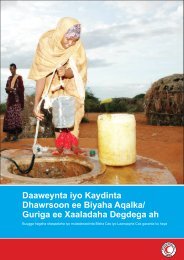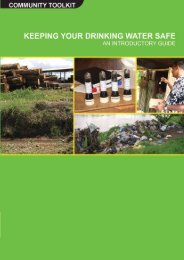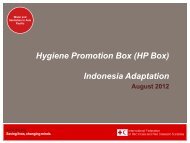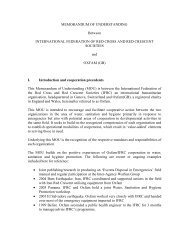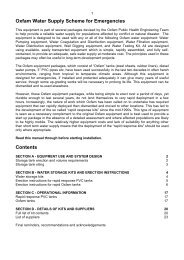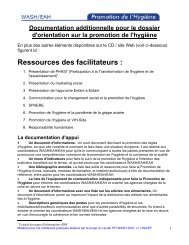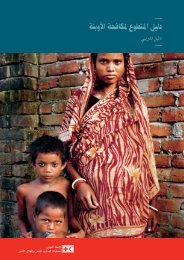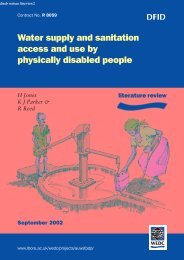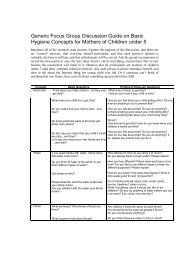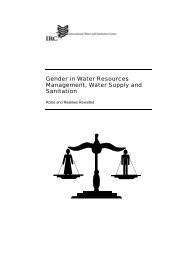Hygiene Promotion - IRC International Water and Sanitation Centre
Hygiene Promotion - IRC International Water and Sanitation Centre
Hygiene Promotion - IRC International Water and Sanitation Centre
You also want an ePaper? Increase the reach of your titles
YUMPU automatically turns print PDFs into web optimized ePapers that Google loves.
green <strong>and</strong> with contaminated water red <strong>and</strong> encourages users to use only green pumps fordrinking water. This is harder than it seems because green pumps may be at a greaterdistance, in another neighbourhood <strong>and</strong>/or belong to another household or households.Sharing is further complicated by greater crowding, longer waiting, more wear <strong>and</strong> tear <strong>and</strong>more frequent breakdowns, <strong>and</strong> differences in class <strong>and</strong> castes.Frequently washing of children’s eyesSkin <strong>and</strong> eye infections are especially common in arid areas. Both have health as well associo-economic consequences. Washing more often can greatly reduce their spread. Arestricting factor is that where water is scarce, using it frugally is a value, a norm <strong>and</strong> ahabit. Young mothers who start washing their children’s faces more often risk to becriticised by mothers-in-law, other women <strong>and</strong> husb<strong>and</strong>s for ‘wasting’ water. A trachomaprevention programme in Tanzania used children’s face washing competitions for mothers,mothers-in-laws <strong>and</strong> fathers to learn through practice that much less water was neededthan thought. With one litre of water, mothers managed to wash 30-35 faces of children,fathers 12 (McCauley et al., 1990, 1992).Social marketing for h<strong>and</strong>washing in Central AmericaA h<strong>and</strong>washing promotion programme in Guatemala found that parents saw clean childrenas more attractive <strong>and</strong> happier. H<strong>and</strong>washing was considered good, but enabling factorswere lacking. Soap, water <strong>and</strong> towels were scattered. H<strong>and</strong>washing placed dem<strong>and</strong>s onmothers’ scarce time <strong>and</strong> energy <strong>and</strong> the family’s resources. Mothers were interested inhygiene education. They wanted short sessions <strong>and</strong> information materials in their ownlanguage <strong>and</strong> Spanish. Approval from fathers was crucial because they objected to higherwater bills.The project introduced a ‘happy corner’ for h<strong>and</strong>washing in the home <strong>and</strong> spreadinformation to mothers on proper ways of washing h<strong>and</strong>s. Fathers <strong>and</strong> children had ownmessages to reinforce the desired behaviours (Booth & Hurtado, 1992). In a secondcampaign, a catalyst (in this case a bilateral project) brought together the governments(which wanted to reduce diarrhoeas) with the private sector (the soap companies) in fivecountries. The campaign promoted proper practices (1:washing both h<strong>and</strong>s 2:with soap3:rubbing at least three times 4: dry with a clean towel) at critical times (1:before foodpreparation 2: before eating 3: after toilet use 4: after cleaning babies’ bottoms).Targeted were mothers in rural areas with low levels of education <strong>and</strong> socioeconomicstatus having children under five <strong>and</strong> primary schoolchildren from these families. Radio<strong>and</strong> television spots were the main media. In the evaluation, one in every three peoplecould recall the campaign. This was less for rural <strong>and</strong> indigenous groups. In the beforeafterstudy in Guatemala, with an estimated outreach to 1,5 million children alone, theability to mention all critical times <strong>and</strong> demonstrate the four proper practices increased by10%., especially in urban areas. Again, a ‘dedicated place’ for h<strong>and</strong>washing supportedgood practice. Changes in the other countries were more modest (Saadé et al., 2001).84 <strong>Hygiene</strong> promotion



